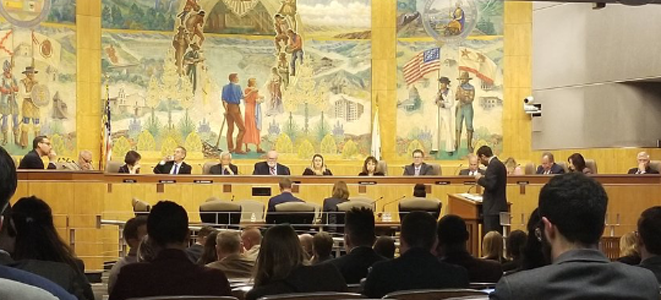Note: GJEL Accident Attorneys regularly sponsors coverage on Streetsblog San Francisco and Streetsblog California. Unless noted in the story, GJEL Accident Attorneys is not consulted for the content or editorial direction of the sponsored content.
A bill that aims to tie transportation investments to climate goals has passed several California Senate policy committees, although one of its strongest and most controversial provisions was removed in the last hearing.
Senator Ben Allen's (D-Redondo Beach) S.B. 526 would have required the State Transportation Improvement Program--known as the STIP--to incorporate climate change considerations into funding allocations. Specifically, it would have required the California Transportation Commission to deprioritize projects that increase vehicle miles traveled (VMT)--such as highway widening--in regions that are not meeting their greenhouse gas emission reduction targets.
That would be pretty much every region, since the transportation sector's emissions are growing throughout the state.
That provision, referred to as the "STIP stick," was removed upon strenuous objections from several regional planning agencies.
"We don't make land use decisions," said Moira Topp, representing the Orange County Transportation Authority. "Our job is to provide full transportation options to all our residents."
Topp also questioned the bill's reliance on VMT as a way to measure greenhouse gas emissions. Environmental planning for the OC Streetcar, she said, showed that the project would increase VMT, both by rerouting some traffic and by bringing new trips to its end points. Under S.B. 526's parameters, such a project would negatively impact a region's ability to reach its goals, and might not be built--whereas it was the kind of transit project that should be celebrated and encouraged.
It would be interesting to explore what that estimated VMT increase is tied to: do estimates show that the streetcar would bring job growth and thus more trips along its corridor, for example? Regardless, her point demonstrates one of the ways policy issues quickly get complicated.
At the bill's first hearing in the Senate Environmental Quality hearing last week, Bill Higgins, representing the California Association of Councils of Governments, had said that actually, the bill did not go far enough. Later, he elaborated further. S.B. 526 is a response to a recent report showing the state is not on track to meet its climate goals, but Higgins charges that it only addresses one part of that report's recommendations.
"The S.B. 150 report says we need to restructure how locals and [regional agencies] and the state work together" to reach climate goals, he said, but S.B. 526 puts the responsibility all on the regional planning agencies. "It just tells the regions: You figure out how to get people out of cars; we're going to track you and see how well you do it," he said. The bill also only addresses a portion of the problem; "regional agencies are supposed to plan to reduce greenhouse gas emissions by some nineteen percent, while the actual reductions needed are closer to 25 percent," he said.
At the Transportation Committee hearing, Higgins said that the regional agencies "are grappling with all of this"--referring to other bills on the docket about autonomous vehicles, housing, and transportation--"but we have very limited authority." If regional governments are to be held responsible for planning outcomes, "we need assistance," he said.
Higgins expressed appreciation for Senator Allen's work on this and other bills, and says he is committed to working with him "on a more holistic approach" to the problem.
Senator Allen accepted the committee's recommendation to delete the "STIP stick" provision. But, he said, he remains committed to keeping the bill strong. It is crucial that the state make investments, including transportation investments, that help meet its climate goals, he said, and "California is unequivocally not on track" to meet them.
"I don't agree with the committee analysis that says this bill is premature," he said. "S.B. 375 [the bill that originally set regional climate goals] was passed ten years ago. And the decisions we make today will be for the long term."
Ella Wise of ClimatePlan, a coalition that supports the bill, said it was disappointing to see the STIP provision removed, since aligning transportation funding with state goals was one of S.B. 526's key ideas. However, she gave credit to Allen for his leadership on the issue, and said she appreciated his commitment to keeping the bill strong.
S.B. 562 would still create a multi-agency working group to identify and take actions to help meet regional emission reduction targets and achieve environmental, equity, climate, health, and housing goals. ClimatePlan remains optimistic that the bill "will ultimately include something about aligning state funding with state goals, or helping the regions meet their goals in some more significant way," she said.
S.B. 526 was "triple-referred," meaning it was assigned to three policy committees in the Senate. It passed the Environmental Quality committee, after a long discussion, and also passed the Transportation Committee on Tuesday. Next it heads to the Housing Committee, which is chaired by Senator Scott Wiener (D-San Francisco).
Follow Streetsblog California on Twitter @StreetsblogCal






